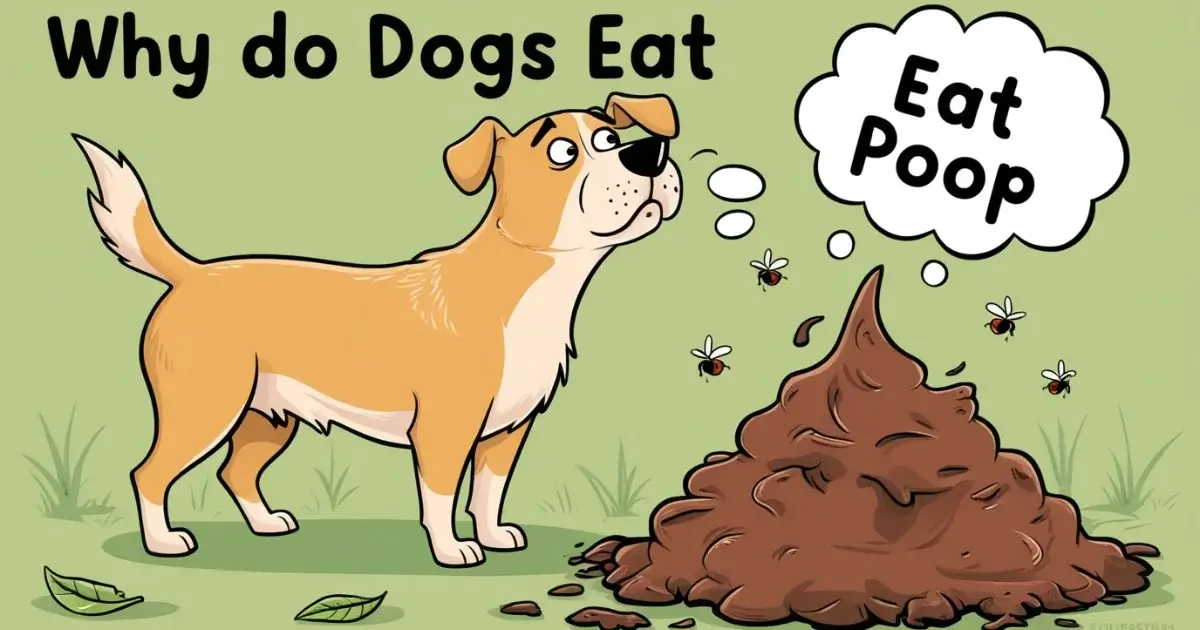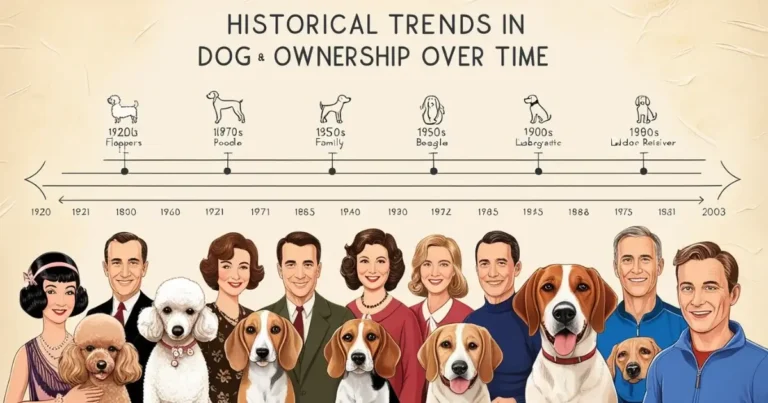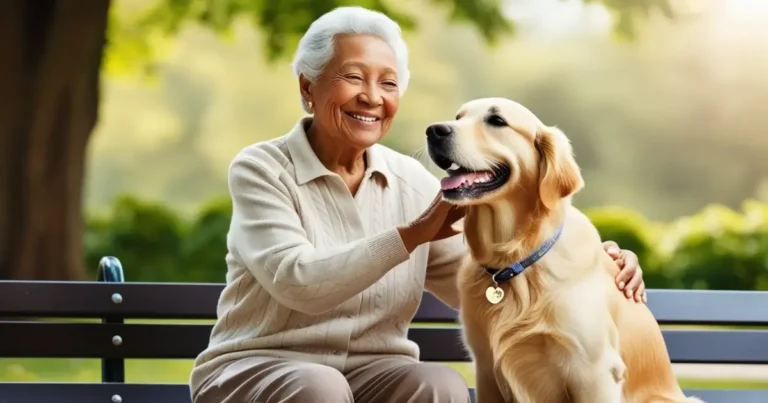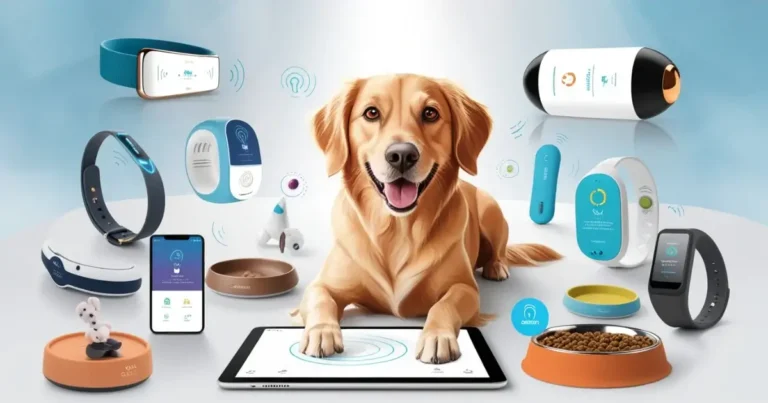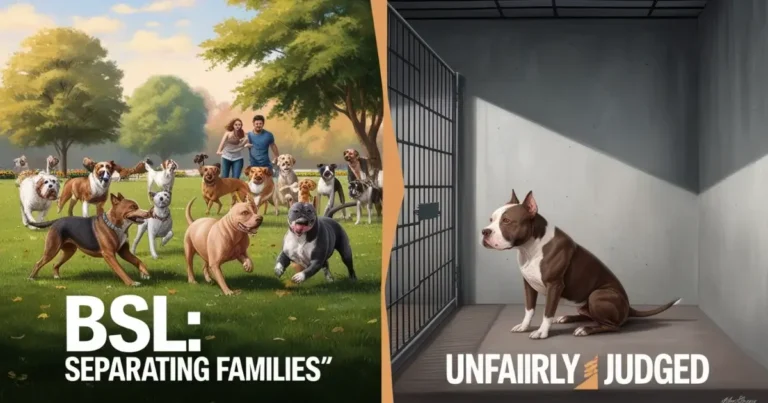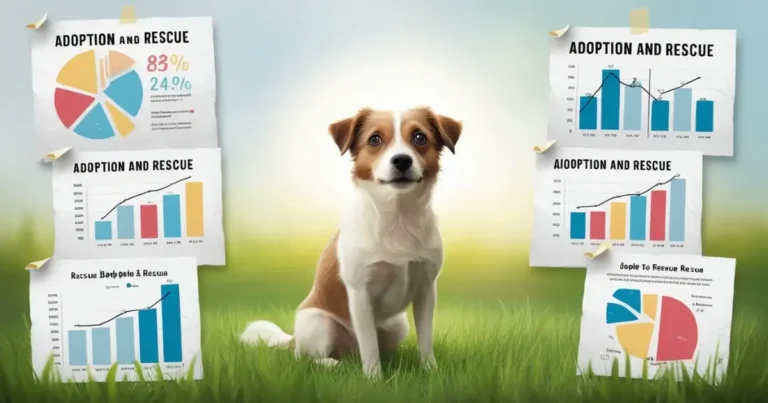Why Do Dogs Eat Poop? Surprising Causes & Easy Solutions
Dogs are loving companions, but sometimes they develop strange habits. One of the most baffling is coprophagic, the act of eating poop. While this may seem disgusting, dogs eat poop for many reasons. Some do it due to instinct, while others may have medical or behavioral reasons behind it.
If you’re asking, “why do dogs eat their own poop” or “why does my dog eat poop,” you’re not alone. This guide covers the main causes and, most importantly, how to stop a dog from eating poop with effective solutions.
Table of Contents
Why Do Dogs Eat Their Own Poop? Understanding the Behavior
Instinctive and Evolutionary Reasons
Dogs’ ancestors survived in the wild by keeping their dens clean. Eating poop helped prevent the spread of parasites, ensuring a safer living environment. Even today, some dogs still follow this natural instinct.
Puppies often mimic their mothers. Mother dogs clean up after their young by consuming their waste, a behavior that helps keep the area sanitary. Puppies may continue this habit out of curiosity before eventually growing out of it.
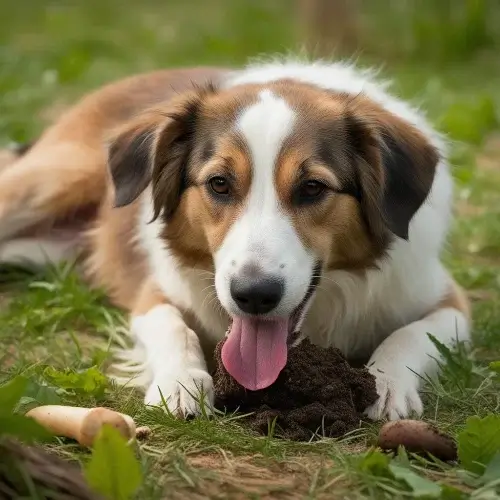
Health-Related Causes
If a dog suddenly starts eating poop, a medical issue could be the cause. Nutritional deficiencies, digestive problems, and underlying illnesses may trigger this behavior. Some common medical reasons include:
| Health Issue | Effect on Dog |
| Vitamin B deficiency | Triggers poop-eating behavior |
| Digestive enzyme imbalance | Causes malabsorption |
| Parasites | Leads to abnormal cravings |
| Diabetes or thyroid issues | Increases hunger |
A vet check is essential if your dog develops this habit unexpectedly. Addressing the root cause can prevent further issues.
Behavioral & Environmental Triggers
A stressful or unstimulating environment can lead to unwanted behaviors. Dogs that are confined in small spaces for long hours are more prone to eating poop. Anxiety, boredom, and loneliness can also contribute to the issue.
Mental stimulation, daily exercise, and interactive play help keep dogs engaged. A well-enriched environment reduces the chances of poop-eating becoming a behavioral habit.
Why Does My Dog Eat Poop? Common Causes & Solutions
Attention-Seeking Behavior
Some dogs eat poop simply because it gets a reaction from their owners. If you panic or yell, your dog may see this as an exciting response. Instead of reinforcing the behavior with attention, it’s better to stay calm and redirect their focus. Rewarding them for ignoring poop is a more effective strategy.
Fear of Punishment
Dogs that have been scolded for accidents may eat their poop to avoid being punished. Harsh training methods can make the problem worse, as they associate poop with getting in trouble. A reward-based training approach is the best way to encourage good bathroom habits without fear.
Smell & Food Association
A dog’s strong sense of smell plays a major role in their eating habits. If food and waste are stored too close together, they may confuse the scents. Keeping feeding and potty areas separate can help prevent this issue.
Why Do Dogs Eat Cat Poop? Understanding Cross-Species Poop Eating
Nutrient Attraction
Dogs are often attracted to cat poop because it contains undigested protein. This habit is especially common in multi-pet households where dogs have access to litter boxes. The strong scent makes it tempting, but eating cat poop can expose dogs to harmful bacteria and parasites.
Preventing Dogs from Accessing Litter Boxes
Keeping the litter box out of reach is the best solution. Using a covered litter box, placing it on a higher surface, or installing pet gates can prevent dogs from accessing it. Simple changes like these can help eliminate the habit.
How to Stop a Dog from Eating Poop: Effective Training Methods
Positive Reinforcement Training
Teaching basic commands like “Leave it” and “Come” can help break the habit. Every time your dog ignores poop, reward them with a treat. Over time, they will associate poop avoidance with positive outcomes.
Leash Training for Controlled Defecation
If your dog immediately tries to eat poop after going to the bathroom, keeping them on a leash during potty breaks allows you to guide them away. Calling them over for a treat as soon as they finish eliminates the opportunity to engage in the habit.
Keeping the Environment Clean
A clean environment removes temptation. Picking up poop immediately after elimination prevents access. This simple change makes a big difference in reducing poop-eating behavior.
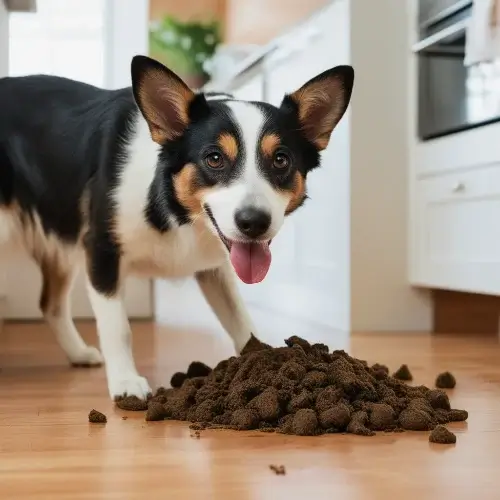
How to Stop Dog from Eating Poop: Home Remedies & Supplements
Dietary Adjustments
A poor diet can contribute to poop-eating habits. Ensuring your dog gets the right nutrients can help.
| Nutrient | Benefit |
| High-protein meals | Reduces cravings for poop |
| Fiber-rich food | Improves digestion & stool bulk |
| Fresh vegetables | Adds variety & nutrients |
Feeding a high-quality, balanced diet is essential for overall health and reducing coprophagia.
Vitamin & Enzyme Supplements
If digestion is poor, a dog may seek out poop to replenish missing nutrients. Supplements such as Vitamin B, digestive enzymes, and probiotics can help improve nutrient absorption and gut health. Adding these to your dog’s diet may prevent the behavior from continuing.
Taste Aversion Methods
Some dogs stop eating poop if it tastes unpleasant. Adding stool deterrents to food can make their poop unappetizing. Bitter sprays can also be applied directly to poop to discourage consumption. Natural remedies like chamomile, garlic, and parsley may also help.
Conclusion
Stopping coprophagia requires patience and consistency. Identifying the cause—whether medical, behavioral, or dietary—is the first step. A combination of training, dietary improvements, and environmental management offers the best results.
Key takeaways:
- Ensure your dog’s diet is complete and balanced.
- Use positive reinforcement rather than punishment.
- Keep the environment clean and free of waste.
- Consider supplements or deterrents if needed.
If the habit continues despite all efforts, consulting a veterinarian or canine behaviorist is the best course of action. With the right approach, your dog can break this habit and stay healthy.
FAQs
Why does my dog eat poop even after training?
If training hasn't stopped this habit, underlying factors like stress, boredom, or medical issues may be involved. Some dogs also develop a learned habit. Increasing mental stimulation, adjusting their diet, and using deterrents can help reinforce better behavior.
How do I stop my dog from eating cat poop in a multi-pet home?
Dogs find cat poop appealing due to its high protein content. To stop this, use covered litter boxes, place them on elevated surfaces, or install pet gates to restrict access. Training commands like "Leave it" also help.
What are some effective home remedies to stop poop-eating?
Adding pineapple, pumpkin, or digestive enzyme supplements to meals can make poop taste unpleasant. Other remedies include bitter sprays and stool-eating deterrent powders. Regular cleanups and positive reinforcement training also prevent the habit.
Can poop eating be a sign of illness in dogs?
Yes, if your dog suddenly starts eating poop, it may signal intestinal parasites, diabetes, or malabsorption issues. It’s best to consult a veterinarian to rule out any medical conditions before addressing it as a behavioral issue.
